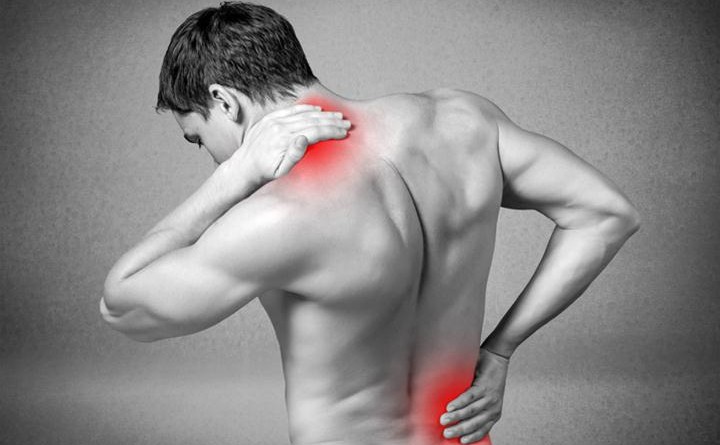Muscle pain, or “Myalgia” is a symptom of a larger condition or disease.
This type of pain is usually localized, affecting just one or more muscles or parts of the body. Almost everyone experiences sore, aching muscles now and then. Muscle pain can range from mild to excruciating, and though it most often goes away after a few days, some muscle pain can persist for months. Muscle pain can develop almost anywhere in the body, including the neck, back, legs, and hands. Muscle pain one feels throughout the body is called, “systemic muscle pain.”
Most minor muscle pain is resolved through self-care and home treatment. Whether a conditioned athlete or a novice, one can become sore after exercise, especially if the workout lasts long than normal, is more intense or uses different muscles. Even severe strains, which can take months to completely heal, usually respond well to home therapy known as “R.I.C.E” (Rest, Ice, Compression, Elevation). For best results, R.I.C.E. should begin within forty-eight hours of an injury. Most muscle pain can be prevented by sufficiently warming up before exercising and cooling down afterward, stretching before exercise and more intense physical activity, drinking lots of fluids, and stretching every hour.

Source: Pixabay/Public Domain
Muscle Pain Causes
Muscle pain is a symptom of a larger condition or disease. The most common causes of muscle pain are tension, stress, overuse and minor injuries. The pain location, duration, and level of intensity relies greatly on what it causing the pain. Outside of trauma, the most common muscle pain causes include chronic exertional compartment syndrome, viral infections, chronic fatigue syndrome, staph infections, claudications, Rocky Mountain spotted fever, dermatomyositis, post-polio syndrome, fibromyalgia, porphyria, influenza (flu), polymyalgia rheumatica, lupus, Lyme disease, myofascial pain syndrome, medications (especially statins), and muscle strain or rupture.
Muscle pain home treatment usually relieves pain from minor injuries, stress or exercise. Muscle pain from severe injuries or systemic disease is often serious and requires medical care. One should schedule an office visit if experiencing muscle pain that lasts longer than a week, signs of infection, such as redness and swelling, around a sore muscle, or poor circulation and muscle pain in the legs. One should call a doctor immediately if experiencing sudden, severe muscle pain that doesn’t go away or that recurs during exercise, have a tick bite or rash, or experience pain after starting a medication. Electrolyte imbalances, such as too little potassium or calcium, can also cause pain.
Risk Factors of Muscle Pain Causes
Firstly, the risk factors of muscle pain have mainly to do with lifestyle, including exercise regimen and occupation. Repetitive strain injury (RSI) causes muscle pain through repetitive tasks, forceful exertions, vibrations, mechanical compression, or sustained awkward positions. Working extended hours in from of computers, driving and traveling are examples. Other typical habits that may cause RSI include tasks that require looking down for extended periods of time such as reading, carrying heavy items, holding a phone between neck and shoulder, prolonged use of the hands, wrists, back and neck without sufficient breaks.
Athletes, construction workers, and those who spend the majority of their days in physical exertion are at a greater risk of injury and muscle trauma, which leads to localized, and possibly systemic, muscle pain. Those with immunodeficiency conditions are more likely to develop an infection that may cause muscle pain. Those taking medications for other, possibly unrelated, conditions are at a higher risk for muscle pain. Withdrawal of chemically dependent substances such as s, barbiturates, benzodiazepines, and alcohol can cause systemic pain. Certain chronic medical conditions that cause one to be immobile and bedridden are at greater risk of muscle pain. Lastly, another specific muscle pain cause is acute rejection after heart transplant surgery.
Featured Image: Thinkstock/Artisteer




